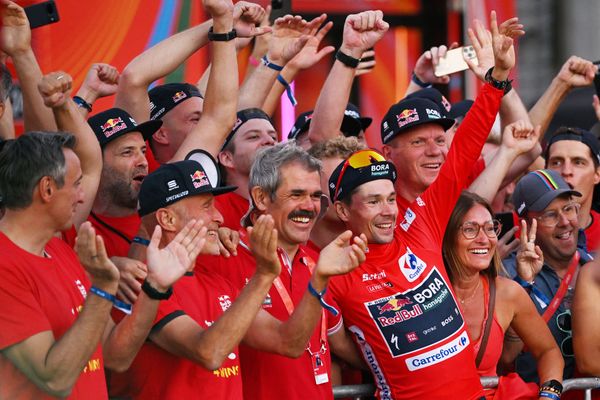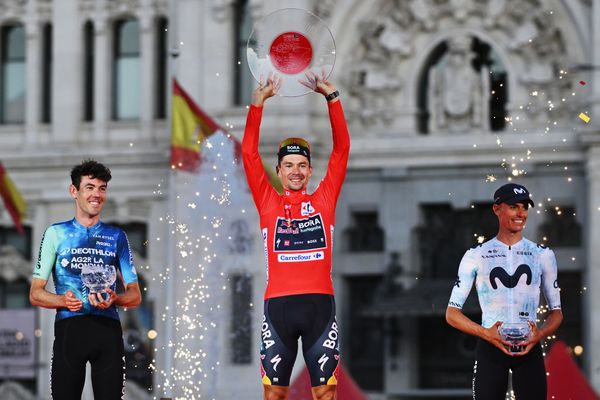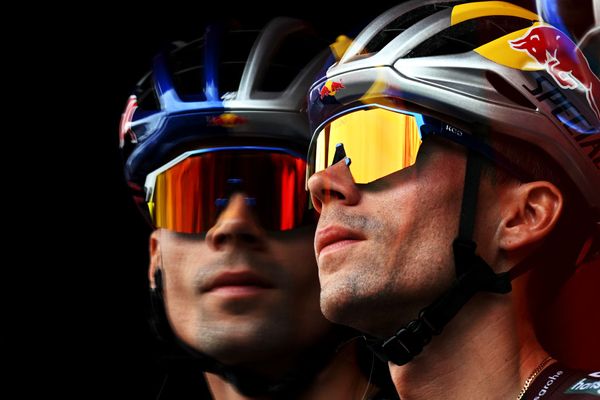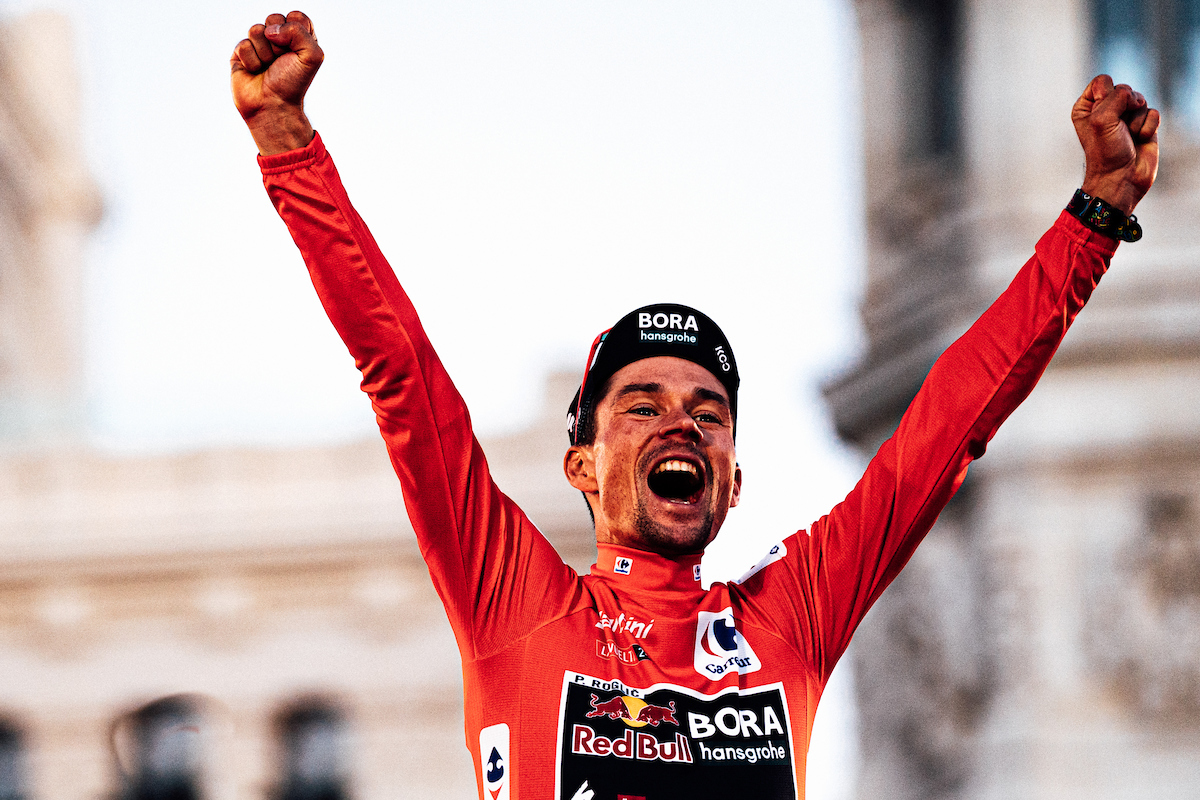
"Sí, se puede! Sí, se puede!" Yes, we can. Beyond the finish line on Madrid’s Gran Via, merry groups of Ecuadorian fans on either side of the street were running through their repertoire of chants and songs in support of Richard Carapaz, happily conducted by a filming television reporter.
After a hearty rendition of "Carapaz y nada más," someone suggested singing the national anthem, but the songbook was torn up into a thunderous roar as their hero wheeled to a halt right in front of them, his Vuelta a España at an end.
A handful of television crews clustered around Carapaz as he composed himself after his time trial, while the rider’s wife Tania and his children stood just outside the scrum and observed the scene. Beyond the barriers, the chants started up all over again, drowning out Carapaz’s soft voice as he talked reporters through his time trial.
"Olé, olé, olé, olé – Richard, Richard!" they repeated over and again, scarcely noticing when Enric Mas and Ben O’Connor rolled into the finish area soon afterwards. Their displays ensured Carapaz had to settle for fourth overall, but that fact did nothing to diminish the outpouring of joy in a small pocket of Madrid that had been transformed into Carchi for the evening.
But while the Gran Via belonged to Carapaz, the Vuelta itself again belonged to Primož Roglič, who sealed a record-equalling fourth overall victory with a businesslike second place in the final time trial.
Roglič would later reveal that he had been afflicted by the same illness that had beset his Red Bull-Bora-Hansgrohe squad on the road to Picón Blanco the previous day, but it was scarcely noticeable from his performance here.
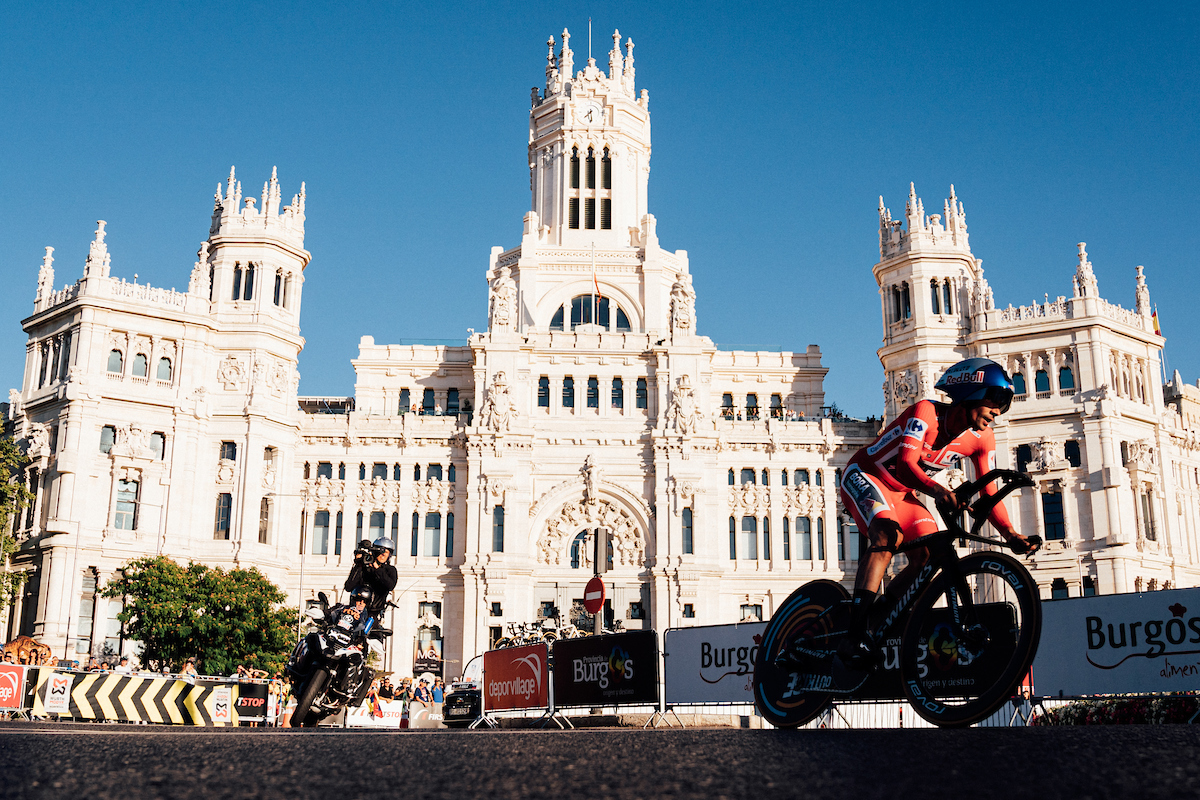
Then again, Roglič has always had a knack for hiding suffering, the furious paddling usually taking place out of sight below the waterline. That’s what made his late collapse at La Planche des Belles Filles on the 2020 Tour de France so shocking, of course, but Roglič’s response was typically composed on that traumatic evening in the Vosges. He embraced his compatriot Tadej Pogacar and then simply resumed his task of winning bike races, claiming another Vuelta – his second – that autumn.
Roglič has known only heartbreak at the Tour in the years since, while the Vuelta has repeatedly offered itself as a salve to those wounds. This year, as in 2021, his Vuelta victory came after he had crashed out of the Tour, and this year, as in 2021, Roglič remained as understated as ever on sealing victory in Spain.
After crossing the finish line on the Gran Via, Roglič smiled and raised a finger in acknowledgement of the victory, before he was ushered back down the boulevard towards the podium on the Plaza de Cibeles.
Red Bull-Bora-Hansgrohe riders and staff, wearing red polo shirts for the occasion, were already spilling into the podium area in anticipation of the ceremony, including riders who had been forced out by illness the previous afternoon.
"The more you go to the end, the more you just want to finish it off," Roglič said as he waited to mount the podium. "It was tough, but everything went fine. It was a fast one, so I’m happy."
Illness
After a flamenco display and an appearance from indie band Miss Caffeina, the prizegiving eventually got underway amid the marble fountains of Plaza de Cibeles, the scene of so many footballing victory celebrations over the years.
For the third time at a Grand Tour this season, the Slovenian anthem ‘Zdravljica’ was played to fete the overall winner, though the Vuelta organisers appeared to opt for a more extended version than the one played for Tadej Pogačar on the Giro d’Italia and Tour de France. Roglič raised a hand when he thought the anthem had come to an end, only for the music to start up all over again.
When the music was turned down, a microphone was offered to Roglič. Like the Tour, the Vuelta has introduced a winner’s speech into its end-of-race formalities, but Roglič was always likely to be concise in his closing remarks.
"Yeah, what can I say? What a Vuelta, eh?" Roglič said, before thanking his family and his team. "I’m really happy and I hope you all enjoyed it as much as we did, thank you."
After Red Bull riders and staff had joined Roglič on the podium for a long succession of photographs, the winner was directed towards the mixed zone, where he revealed that he had also been afflicted by the illness that had laid so many teammates low the previous day. Red Bull said they would be "investigating" if food poisoning was the cause.
"I also went to the toilet twenty times already today, but in the end, I was way too far, I had to finish it off," said Roglič, though he was reluctant to discuss the matter in any detail. "These things are for later. Now is time to enjoy a bit the victory."
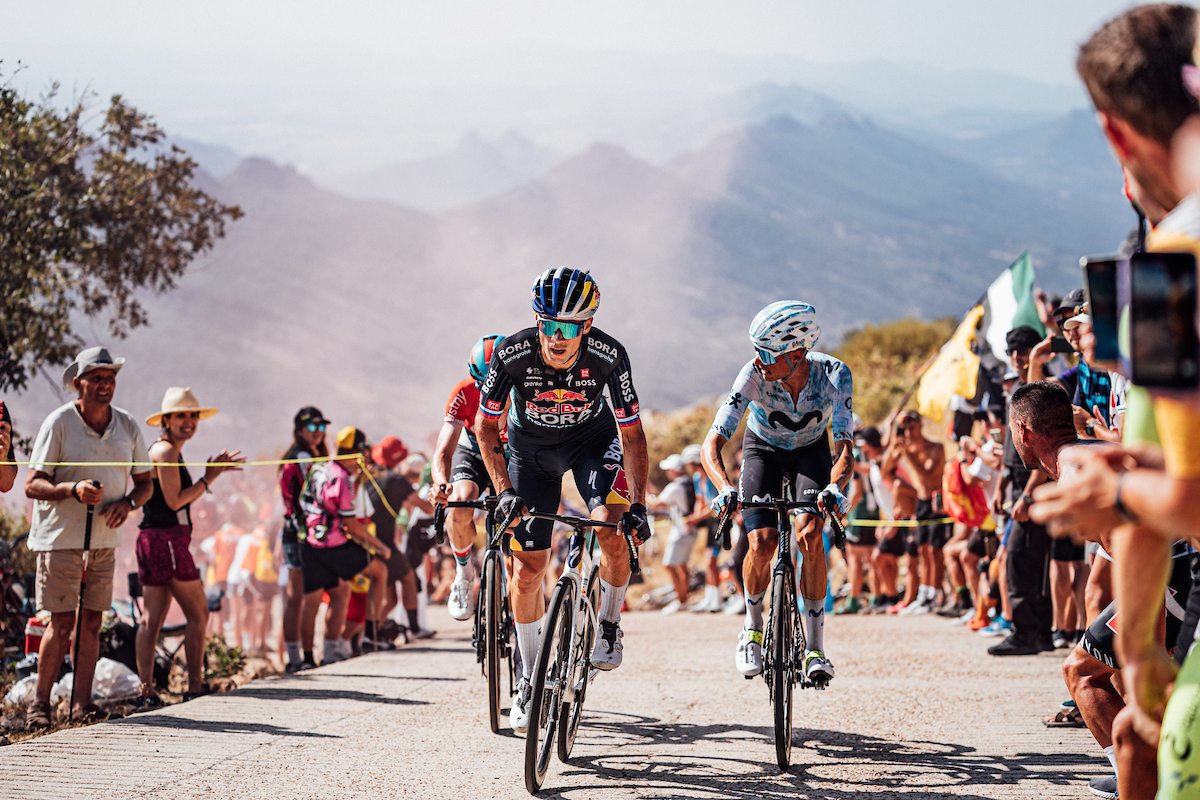
The future
Red Bull manager Ralph Denk, meanwhile, was diplomatically batting away questions of a different kind, namely on the persistent rumour that Remco Evenepoel will leave Soudal-QuickStep to lead his team at the Tour de France next season.
"I hear and read the rumours every day in Italian, English and Belgian newspapers, but I have nothing to say about it," Denk told Het Laatste Nieuws. "They are gossip and I may not, cannot and will not respond to them – no matter how annoying that is for you journalists."
It must be annoying for Roglič, too, given that he left Jumbo-Visma last winter with the aim of winning the Tour for Red Bull-Bora-Hansgrohe. Roglič will turn 35 next month, and it remains to be seen if his fourth Vuelta win – and fifth Grand Tour victory in total – marks the summit of his achievements or a step towards a loftier goal.
In his press conference late on Sunday night in the Mandarin Ritz hotel, Roglič was asked if he would finish his career with Red Bull-Bora-Hansgrohe, where he has a contract until at least the end of 2025.
"I’m in this team," Roglič said. "You don’t know, it’s way too hard to be sure what the future will bring. At the moment, yes, I’m riding. I just won this Vuelta with Red Bull-Bora-Hansgrohe and it’s really beautiful to be a part of it. I hope we can enjoy it and have a nice celebration."
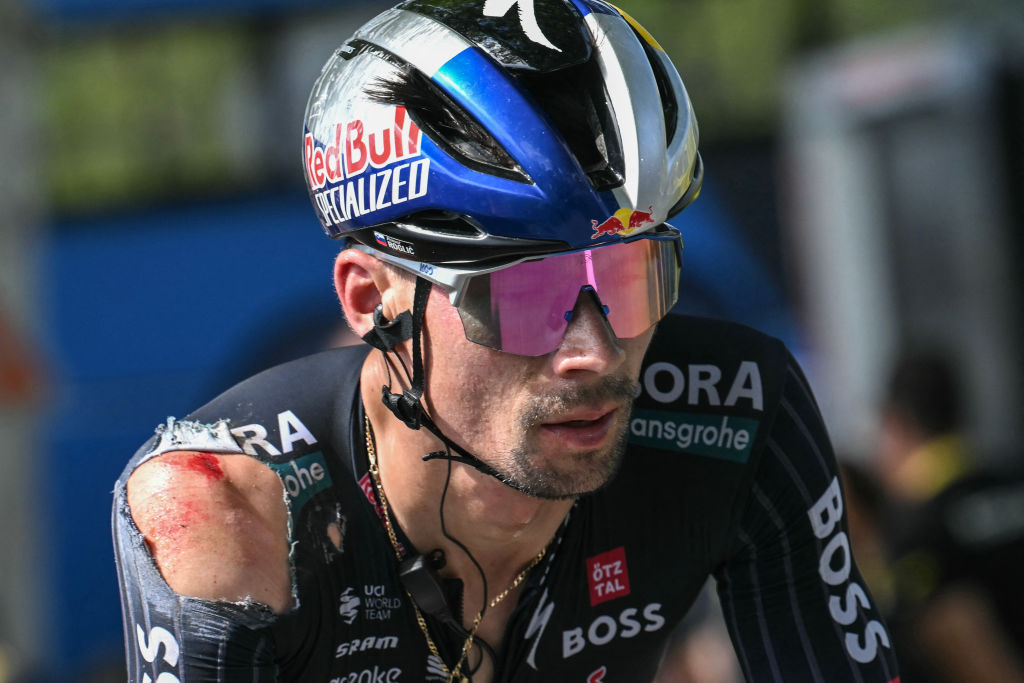
Roglič’s fourth Vuelta victory came after he suffered a fractured vertebra in the crash that forced him out of the Tour, and even though he won at Pico Villuercas and Cazorla in the opening week, it was clear that his back remained a cause for concern deep into the race.
"It’s a lot better definitely now," said Roglič, whose ill-starred Tour bid was followed almost immediately by his Vuelta build-up. "After the Tour, I was three or four days at home, and then I was doing strength work. I was only at home for a couple of days since May 6, it takes quite some effort."
The Vuelta itself also took quite some effort for the master of understatement. Although Roglič was several rungs above all rivals on the Puerto de Ancares and the Alto de Moncalvillo, he endured some complicated moments too, not least when O’Connor stormed into a lead of almost five minutes in the opening week.
"I just went day by day, the best I could," Roglič said. "It was quite a challenge to be quite some minutes behind, that changed the way race was going. I’m very happy, because this was not easy, and the season was not easy."
Roglič never looked likely to panic. He chipped away at O’Connor’s lead for more than two weeks, finally overhauling the Australian at Montcalvillo with two days to spare. This time nothing, not even a late illness, could knock him off course.
"It’s normal you have ups and downs, we’re human beings," Roglič said. "The most important thing is that you always focus on the task that you have, it’s the only thing you can control. If that means it’s enough for the win, we win. If we finish in some other place, it means some other guys were just better."






